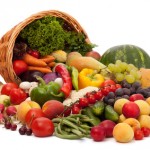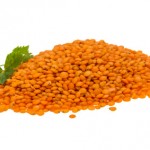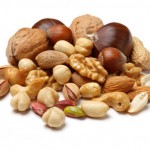Most athletes know that they should pay attention to choosing the right foods and beverages to help fuel workouts and promote recovery, but when it comes to their overall diet, there seems to be more variability. While some athletes make healthy eating a priority, others have a more cavalier attitude, thinking their hours of training somehow cancels out poor food choices. Diet has a strong influence on a person’s risk for many chronic diseases (e.g. diabetes, heart disease, cancer). Whether or not these diseases are on your radar screen, improving your diet outside of training can have many benefits. The same biological mechanisms by which diet helps promote long-term health can influence how you feel day-to-day, encourage a strong immune system, keep you lean, and might even help you perform better.
Here are some tips to help you choose foods that will benefit your overall health.
Eat plenty of vegetables and fruits
 Long recognized as terrific sources of vitamins, minerals, and fiber, vegetables and fruits contain many other substances that will keep you healthy and might help protect from disease. Aim for at least 5 vegetable servings/day and 3 fruit servings (not juice)/day, choosing a good variety so you’ll benefit from diverse nutrients.
Long recognized as terrific sources of vitamins, minerals, and fiber, vegetables and fruits contain many other substances that will keep you healthy and might help protect from disease. Aim for at least 5 vegetable servings/day and 3 fruit servings (not juice)/day, choosing a good variety so you’ll benefit from diverse nutrients.
 Include legumes
Include legumes
Reduce your sugar intake
Endurance athletes rely on the sugars in sports drinks, bars, and gels to fuel their workouts and help their muscles recover. This is good, because these sugars are just what the muscles need for optimum performance. But when you’re not exercising, it’s a good idea to limit your sugar intake. Consuming large amounts of sugar provides a lot of calories without nutrients, and raises insulin levels. While you’re exercising this is desirable, but routine high insulin levels is thought to be a risk factor for many diseases. Read labels for sugar content, and try to notice added sugars in the ingredient list.
Though soft drinks are recognized for their high sugar content, it’s good to be aware that some commonly consumed foods and beverages contain surprisingly high amounts of sugar. For example, 1 cup of flavoured yogurt contains about 11 teaspoons (42 g) of sugar, and most fruit juice contains almost as much sugar as the same amount of soft drink (1.5 cups = 8-10 teaspoons of sugar; and 15 teaspoons for grape juice). Better to consume these foods after a workout when your body can use the sugars to help promote muscle recovery, but not while you’re sitting at a desk or relaxing on the couch. Opt for plain yogurt (add your own fruit), and fresh fruit rather than juice.
Limit refined grains
Many of the carbohydrates you’re consuming during workouts are refined and contain few other nutrients, so make a point of making the rest of the carbs that you eat nutrient dense. Opt for whole grains rather than refined grains (for example, choose brown rice instead of white rice). Whole grains are naturally rich in vitamins, antioxidants, minerals, fiber, and other protective compounds linked to disease prevention. When grains are refined most of the beneficial nutrients are removed. Try to get eat most of your whole grains in the unprocessed form (i.e., eat whole oats rather than cheerios/oat squares). Processing whole grains into powders for flours and cereals produces foods that are more likely to increase blood sugar and raise insulin levels, a condition associated with chronic inflammation. Think beyond oats, rice, and whole wheat pasta, by trying other grains like quinoa or bulgur.
Focus on healthy fats
 The fat in your diet should be mainly monounsaturated (avocados, canola oil, nuts, olives, olive oil) and the omega-3 polyunsaturated fats (fatty fish, flaxseeds, walnuts). Limit oils high in omega-6 fats (corn, cottonseed, safflower, soy, sunflower): the typical Canadian and American diet is overloaded with omega-6 fats and deficient in omega-3 fats. This imbalance increases the risk of diseases associated with chronic inflammation. Limit saturated fats (found mostly in fatty cuts of meat, sausages, dairy), and eliminate trans fats (added to many processed foods to extend shelf life). It’s a good idea to obtain your fats from whole foods like nuts, seeds, fish, and avocados, since these foods also contain other health-promoting compounds.
The fat in your diet should be mainly monounsaturated (avocados, canola oil, nuts, olives, olive oil) and the omega-3 polyunsaturated fats (fatty fish, flaxseeds, walnuts). Limit oils high in omega-6 fats (corn, cottonseed, safflower, soy, sunflower): the typical Canadian and American diet is overloaded with omega-6 fats and deficient in omega-3 fats. This imbalance increases the risk of diseases associated with chronic inflammation. Limit saturated fats (found mostly in fatty cuts of meat, sausages, dairy), and eliminate trans fats (added to many processed foods to extend shelf life). It’s a good idea to obtain your fats from whole foods like nuts, seeds, fish, and avocados, since these foods also contain other health-promoting compounds.
Eat fish
Fish contributes to an overall healthy diet and is one of the best animal protein choices. Eating fish may lower the risk of heart disease and stroke, according to convincing research. Other studies suggest that eating fish may help ward off Alzheimer’s disease, depression, rheumatoid arthritis and other auto-immune disorders, and some types of cancer. The benefits may be to be due to the healthy omega-3 fats found in fish, or the fact that fish is replacing less healthy protein options (i.e., red, processed meats). Use this guide to choose fish that are environmentally sound and low in contaminants.
Limit or avoid processed meats
Processed meats have received more scientific scrutiny lately, and the results are not good. A recent study showed that one daily serving of processed meat (e.g., 1 hot dog, 1-2 slices deli meat) increased diabetes risk by 51 percent. Other research has strongly implicated processed meats in heart disease risk (42% increased risk) and colorectal cancer. Opt for unprocessed meats, or better still, replace some meat with fish or plant-based proteins (beans, legumes), which have proven health benefits.
Bottom Line
When you’re not training, choose mostly whole (minimally processed) foods like vegetables, fruits, whole grains, and legumes. These foods are naturally rich in protective compounds that will keep you healthy day-to-day, and in the long term can help prevent diseases.
More Sports Nutrition Articles
- Nutrition Strategies for Health and Athletic Performance
- Dietary Nitrates, Sports Performance, and Health
- Athletes Avoiding Gluten and Grains: Is There Good Evidence?
- The Iron Needs of Athletes: Who Needs More, and How to Get it Through Your Diet
- Healthy or Hype? Chocolate Milk for Recovery
- How Much Protein Do You Need?
- What Should I Eat Before I Workout?
- Energy Bars: What to Look for, Real Food Alternatives, and How to Make Your Own
- Will Beet Juice Improve Endurance Performance?
- Refueling for Recovery
- You Fuel your Workouts, but How Does the Rest of your Diet Stack Up?
______________
Updated July 12, 2014